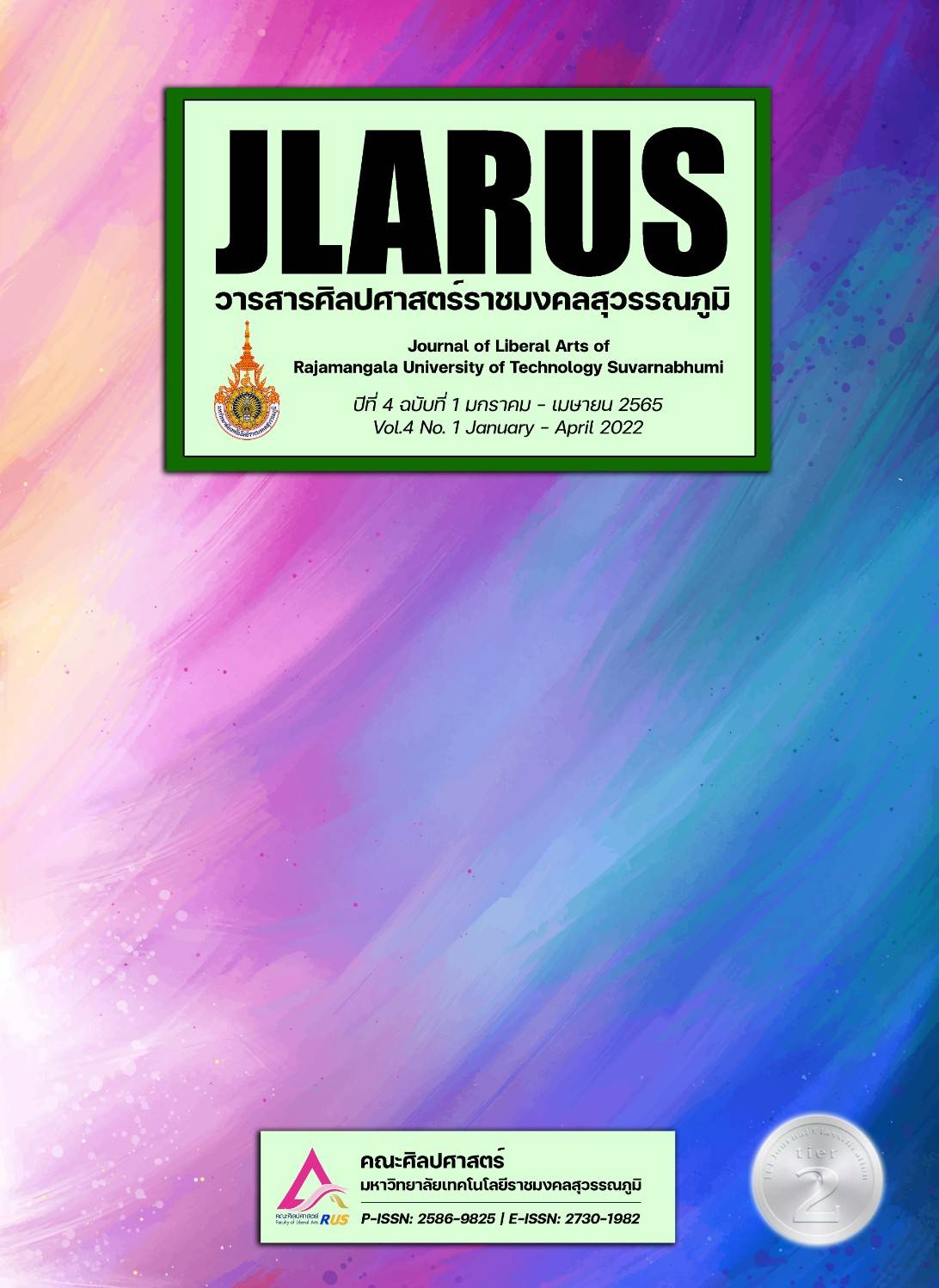STUDY OF MATHEMATICS ACHIEVEMENT BY USING LEARNING ACTIVITIES THAT PROMOTE PROBLEM-SOLVING SKILLS AND MATHEMATICAL CONNECTION SKILLS
Main Article Content
Abstract
This research paper aimed at 1) investigating the quality of three lesson plans
promoting problem-solving skills and mathematical connection skills, 2) comparing the
achievement scores by means of learning activities that promoted problem-solving skills
and mathematical connection skills, and 3) discovering the learners’ opinions towards
the set-up of learning activities that would promote problem-solving skills and
mathematical connection skills. This study was conducted in the second semester in
the academic year 2020. The sample under this study was 24 undergraduates from the
Faculty of Business Administration and Information Technology, University, province,
Thailand, whose degree was in a higher certificate. The five research instruments
consisted of 1) lesson plans, 2) a mathematics achievement test, 3) a test to evaluate
the learners’ problem-solving skills and mathematical connection skills, 4) a
questionnaire for obtaining the students’ opinions of the set-up of the learning activities
that would promote problem-solving skills and mathematical connection skills, and 5)
an observation form. The data analysis comprised the percentage, mean, standard
deviation, and t-test.
The findings revealed that 1) the quality of the three lessons was rated as high,
2) the mathematics achievement test by means of the learning activities that promoted
problem-solving skills and mathematical connection skills was higher than the criteria
(70%), and 3) the students agreed that the set-up of the learning activities that promoted
the problem-solving skills and mathematical connection skills was appropriate. The
findings from this study concluded that choosing to use mathematical problem
situations in everyday life where learners could choose to use informal tactics to find
answers would be a starting point for building a body of knowledge. Furthermore, this
would be a way to encourage students to have appropriate problem-solving skills and
mathematical connection skills.
Article Details

This work is licensed under a Creative Commons Attribution-NonCommercial-NoDerivatives 4.0 International License.
References
กระทรวงศึกษาธิการ. (2551). หลักสูตรแกนกลางการศึกษาขั้นพื้นฐานพุทธศักราช 2551. กรุงเทพมหานคร: สํานักงานคณะกรรมการการศึกษาขั้นพื้นฐาน กระทรวงศึกษาธิการ.
กัลยา วาณิชย์บัญชา. (2552). สถิติสําหรับงานวิจัย. กรุงเทพมหานคร: จุฬาลงกรณ์มหาวิทยาลัย.
ชนิดา จําปาอ่อน. (2562). การจัดการเรียนรู้ตามแนวคิดการศึกษาคณิตศาสตร์ที่เชื่อมโยงกับชีวิตจริงเพื่อส่งเสริมความสามารถในการแก้ปัญหาทางคณิตศาสตร์สําหรับนักเรียนชั้นมัธยมศึกษาปีที่ 6 (วิทยานิพนธ์ปริญญามหาบัณฑิต). นครปฐม: มหาวิทยาลัยศิลปากร.
ดวงเดือน อ่อนน่วม. (2547). การจัดการเรียนรู้แบบบูรณาการองค์ความรู้จากการวิจัยและพัฒนาเพื่อปฏิรูปการเรียนรู้ทั้งโรงเรียน. กรุงเทพมหานคร: จุฬาลงกรณ์มหาวิทยาลัย.
ยุพิน พิพิธกุล. (2539). การเรียนการสอนคณิตศาสตร์. กรุงเทพมหานคร: บพิธการพิมพ์.
นาตยา ปิลันธนานนท์. (2545). จากมาตรฐานสู่ชั้นเรียน. กรุงเทพมหานคร: ไทยวัฒนาพานิช.
สุพรรษา กลัดน้อย. (2560). การพัฒนากิจกรรมการเรียนรู้ทางคณิตศาสตร์โดยเชื่อมโยงกับงานในด้านพระพุทธศาสนาในระดับมัธยมศึกษาตอนต้น (วิทยานิพนธ์ปริญญามหาบัณฑิต). นครปฐม:มหาวิทยาลัยศิลปากร.
สุคนธ์ สินธพานนท์วรรัตน์ วรรณเลิศลักษณ์ และ พรรณี สินธพ. (2550). พัฒนาทักษะการคิด: พิชิตการสอน. กรุงเทพมหานคร: ห้างหุ้นส่วนจํากัด 9119 เทคนิคพริ้นติ้ง.
สํานักส่งเสริมวิชาการและงานทะเบียน. ( 2563). ข้อมูลจํานวนนักศึกษาลงทะเบียนประจําปีการศึกษา2563. พระนครศรีอยุธยา: มหาวิทยาลัยเทคโนโลยีราชมงคลสุวรรณภูมิ.
อัมพร ม้าคนอง. (2554). ทักษะและกระบวนการทางคณิตศาสตร์: การพัฒนาเพื่อพัฒนาการ.กรุงเทพมหานคร: ศูนย์ตําราและเอกสารทางวิชาการ คณะครุศาสตร์ จุฬาลงกรณ์มหาวิทยาลัย.
Bloom, B. (1956). Taxonomy of Educational Objectives, the classification of Educational goals–Handbook I: Cognitive Domain. New York: McKay.
Charters, W. W. , & Good, C. V. (1945) . The Dictionary of Education. The Phi DeltaKappan, 27(1), 5-7.
Gurat, M. G. (2018). Mathematical Problem-Solving Strategies among Student Teachers. Journal on Efficiency and Responsibility in Education and Science, 11(3), 53-64.
Intaros, P., Inprasitha, M., & Srisawadi, N. (2014). Students’ problem-solving strategies In problem solving-mathematics classroom. Procedia-Social and Behavioral Sciences, 116, 4119-4123.
Kim, J. Y. et al., (2018). The role of problem-solving ability on innovative behavior andopportunity recognition in university students. Journal of Open Innovation: Technology, Market, and Complexity, 4(1), 4.
Menanti, H., & Sinaga, B. (2018). Improve Mathematical Connections Skills with Realistic Mathematics Education Based Learning. In 3rd Annual International Seminar on Transformative Education and Educational Leadership ( AISTEEL 2018) (pp.29-35). Atlantis Press.
Pambudi, D. S. et al., (2020). The Role of Mathematical Connections in Mathematical Problem Solving. Jurnal Pendidikan Matematika, 14(2), pp.129-144.
Santos-Trigo, M. (2020). Problem-solving in mathematics education. Encyclopedia of mathematics education, Cham. https://doi.org/10.1007/978-3-030-15789- 0_129.
Sari, D. N. et al.,. (2020) . Analysis of the ability of mathematical connections ofmiddleschool students in the field of algebra. In Journal of Physics: Conference Series (Vol. 1469, No. 1, p. 012159). IOP Publishing.


